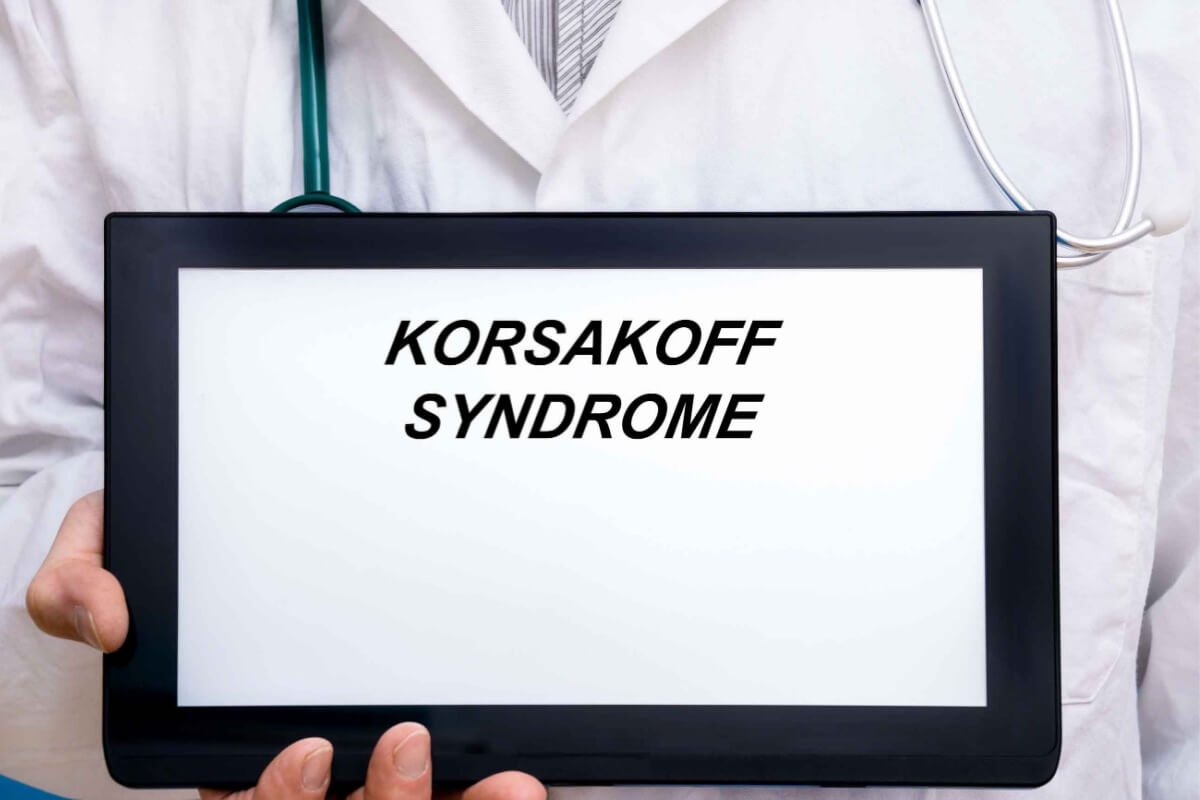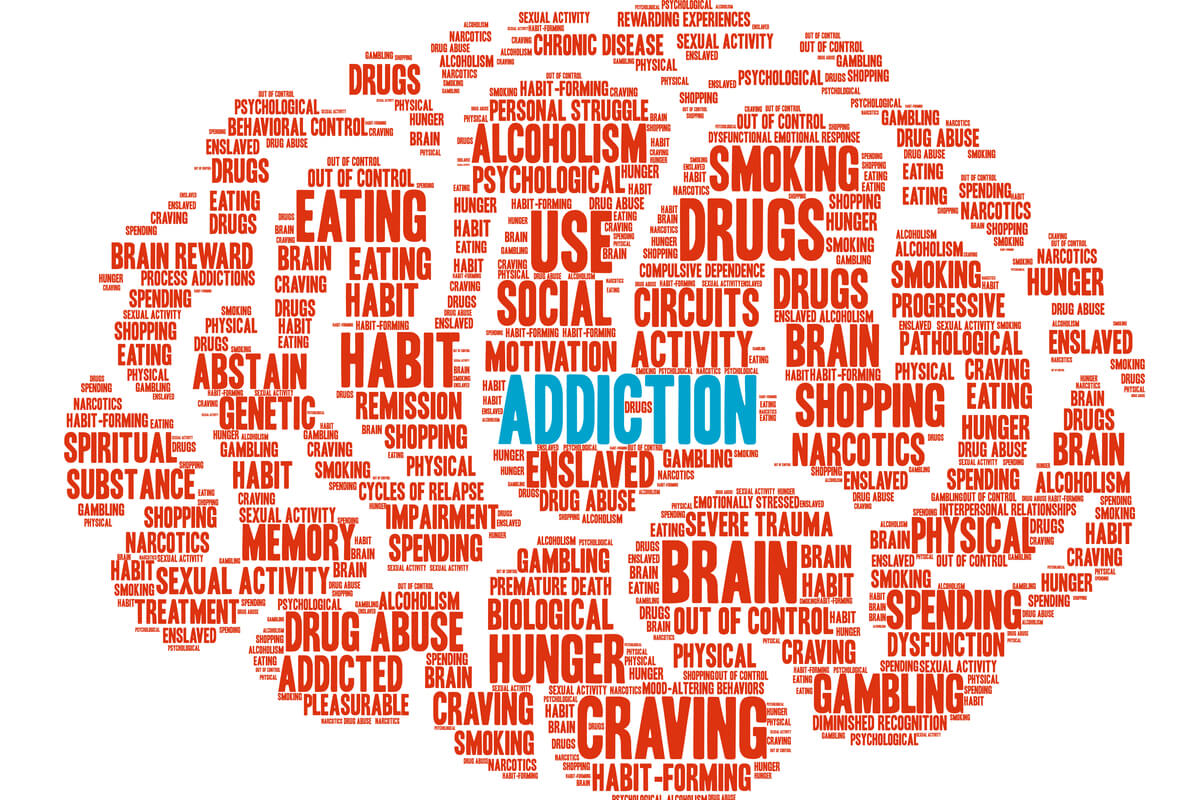
Alcohol-related dementia, also known as Korsakoff syndrome, is a serious consequence of prolonged alcohol misuse, causing significant brain damage, memory loss, and a syndrome that looks clinically like “dementia”.
Dementia is a syndrome of impaired brain functions and memory loss. Dementia can be caused by many different things. Alcohol-related dementia is thought to be caused by a thiamine deficiency brought on by significant alcohol consumption over many years and resulting nutritional deficiencies.
Alcohol-related dementia causes short-term and eventually longterm memory loss. Individuals with Korsakoff syndrome have trouble forming new memories and retaining information. They often unintentionally make up events to fill memory gaps, called confabulation.
What Is Korsakoff Syndrome?
Korsakoff syndrome is an irreversible neurological disorder that is generally preceded by Wernicke encephalopathy, which causes intense swelling of the brain after prolonged and repeated exposure to alcohol.
Symptoms of Wernicke encephalopathy and Korsakoff syndrome can overlap, and form a spectrum of severity, referred to as Wernicke-Korsakoff syndrome.
Korsakoff syndrome can cause permanent brain damage to the regions of the brain that are involved in the formation of new memories and the retention of new information. Symptoms are often viewed as similar to those associated with dementia.
Long-term alcohol misuse can cause brain damage, as sustained, high-level drinking can deplete the body of thiamine (vitamin B1), which the brain needs to function properly.[1] Around 80% to 90% of people who get Wernicke encephalopathy will eventually develop Korsakoff syndrome if they continue to consume alcohol. [2]
Symptoms of Alcohol-Related Dementia
Typically, symptoms of Korsakoff syndrome begin after the condition has progressed beyond the stage of Wernicke encephalopathy, and those symptoms have at least somewhat resolved. The following are symptoms of Wernicke encephalopathy:
- Disorientation
- Confusion
- Mild memory loss
- Loss of muscle coordination
- Unsteady gait
- Abnormal eye movements
Korsakoff syndrome can progress from Wernicke encephalopathy. Symptoms of Korsakoff syndrome include the following:[3]
- Loss of short-term memory
- Inability to form new memories
- Confabulation (making up stories or events to fill in memory gaps)
- Hallucinations (seeing or hearing things that are not actually there)
Wernicke-Korsakoff syndrome can continue to progress. About a quarter of people with the disorder will need long-term institutionalization.[4]
Korsakoff syndrome can lead to permanent brain damage. In very severe cases, it is fatal in about 10% to 15% of cases.
Assessment & Diagnosis of Korsakoff Syndrome
The symptoms of Korsakoff syndrome can often look like signs of acute alcohol intoxication, a head injury, severe infection, or more common causes of dementia such as alzheimers or vascular dementia, which can make it difficult to accurately diagnose the condition. There are not any specific neuroimaging procedures or laboratory tests that are able to definitively diagnose Korsakoff syndrome specifically. It is a diagnosis made based on the presence of memory changes in someone with no other clear cause and who has a history of heavy alcohol use.
It is important that a full medical workup be performed on someone who is showing symptoms of either Wernicke encephalopathy or Korsakoff syndrome to rule out other causes of dementia. Signs of potential dementia should be monitored, and cognitive changes should be evaluated and assessed. It is also important to disclose long-term and chronic alcohol misuse, so medical providers can check for thiamine (vitamin B1) deficiency.
To screen for alcohol-related dementia, a medical professional should perform a screening to ascertain the level of memory loss and cognitive change. Questions regarding recent memory to check for the ability to retain information and form new memories should be included in this screening.
Treatment of Alcohol-Related Dementia
Wernicke-Korsakoff syndrome is treated through the replacement of thiamine and proper levels of nutrition and hydration.[3] In addition, cessation of alcohol is the only real treatment long term.
It is important not to attempt treatment yourself and to seek help from medical professionals. A person with Wernicke encephalopathy is in a notably delicate condition and will need thiamine replacement treatments, ideally through an IV, usually requiring admission to the hospital.
Is It Reversible?
The damage to the brain caused by thiamine deficiency with Korsakoff syndrome is permanent and not reversible. That being said, if the disorder is treated early and aggressively enough, the progression of the disorder can be stalled, and a person can make improvements. [5]
Many symptoms of the condition can be reversed or at least significantly improved, however. The lack of muscle coordination, unsteady gait, abnormal eye movements, and symptoms of acute Wernicke encephalopathy can be reversed with prompt and proper treatment and medical attention.[6]
Mental confusion and memory issues can take several months to resolve. Depending on the progression of alcohol-related dementia, these issues may never completely reverse.
People with severe Korsakoff syndrome often require around-the-clock care. Rehabilitation and treatment at this point are supportive in nature.
Alcohol-Related Dementia FAQs
Is dementia from alcohol reversible?
It depends. In its early stages, it can be treated with high dose thiamine supplementation. However, in later stages of disease, it is generally not reversible. Therefore, the best and most reliable preventative treatment is discontinuing alcohol use.
What are the signs of alcohol-related dementia?
Alcohol-related dementia begins with mental confusion and delirium and progresses into short-term memory issues. Someone with alcohol-related dementia will not be able to form new memories, have difficulties retaining new information and learning new things, and often make things up to fill in memory gaps (“confabulation”). They may also have visual or auditory hallucinations in severe cases.
Unsteady gait, loss of muscle coordination, and abnormal eye movements are additional common symptoms of alcohol-related dementia in the early stages.
How much do you have to drink to get alcohol-related dementia?
Alcohol-related dementia is caused by chronic and long-term alcohol misuse. This means that a man who drinks 35 or more drinks in a week, or a woman who drinks 28 drinks or more in a week, for a period of 5 to 10 years or more is at risk for developing Wernicke encephalopathy. However, every patient is different. Some people may never develop WK syndrome while others may develop it at a young age or at comparatively lower levels of alcohol consumption.
Can you keep drinking alcohol after getting alcohol-related dementia?
Alcohol related dementia is a bad prognostic sign, and usually means that AUD is severe. If you have symptoms of alcohol-related dementia, you should always seek immediate professional medical attention. There are many treatments for AUD – both pharmacologic and nonpharmacologic – that are available to help you in recovery.

Medically Reviewed By Elena Hill, MD, MPH
Elena Hill, MD; MPH received her MD and Masters of Public Health degrees at Tufts Medical School and completed her family medicine residency at Boston Medical Center. She is currently an attending physician at Bronxcare Health Systems in the Bronx, NY where ... Read More
- Wernicke-Korsakoff Syndrome. Alzheimer’s Society United Against Dementia. https://www.alzheimers.org.uk/about-dementia/types-dementia/wernicke-korsakoff-syndrome. 2022. Accessed June 2022.
- Wernicke-Korsakoff Syndrome. National Organization for Rare Disorders. https://rarediseases.org/rare-diseases/wernicke-korsakoff-syndrome/. 2021. Accessed June 2022.
- Wernicke-Korsakoff Syndrome. U.S. National Library of Medicine. https://medlineplus.gov/ency/article/000771.htm. September 2021. Accessed June 2022.
- Wernicke-Korsakoff Syndrome. StatPearls. https://www.ncbi.nlm.nih.gov/books/NBK430729/. January 2022. Accessed June 2022.
- The Evolution and Treatment of Korsakoff’s Syndrome. Neuropsychology Review. https://www.ncbi.nlm.nih.gov/pmc/articles/PMC3545191/. June 2012. Accessed June 2022.
- Korsakoff’s Syndrome: A Critical Review. Neuropsychiatric Disease and Treatment. https://www.ncbi.nlm.nih.gov/pmc/articles/PMC5708199/. November 2017. Accessed June 2022.
Download Our Free Program Guide
Learn about our program, its effectiveness and what to expect
Related articles
Imagine what’s possible on the other side of opioid use disorder.
Our science-backed approach boasts 95% of patients reporting no withdrawal symptoms at 7 days. We can help you achieve easier days and a happier future.









